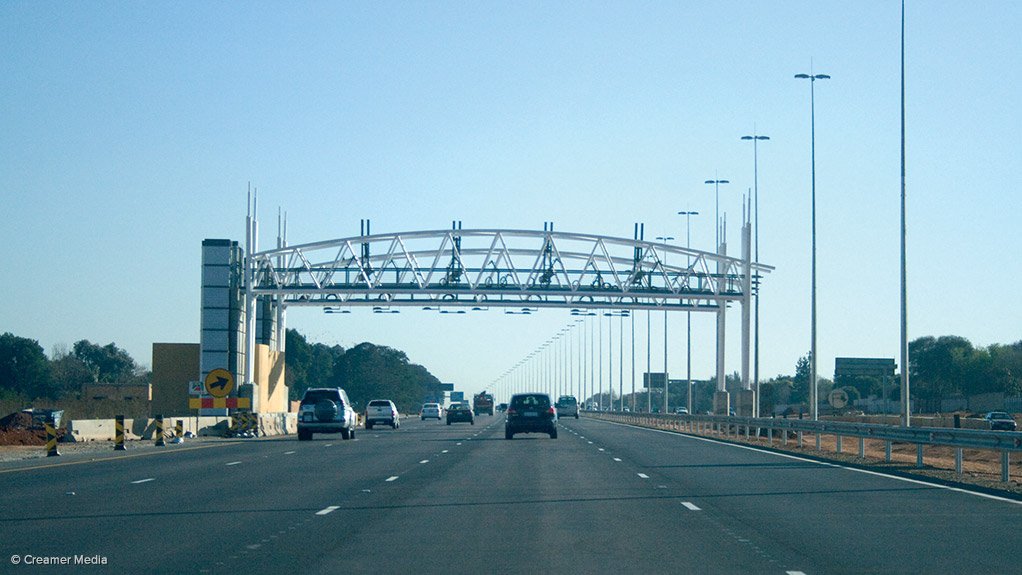The South African National Roads Agency Limited (Sanral) was awaiting President Jacob Zuma’s signature on the Transport Laws and Related Matters Amendment Bill, before it could start the roll-out of electronic, or e-tolling on Gauteng’s highways, said Sanral CEO Nazir Alli this week.
He said he did not know when the Bill would be promulgated.
Presidency spokesperson Mac Maharaj could not provide a timeline for the possible implementation of e-tolling on Gauteng’s upgraded highways either.
He told Engineering News Online that the Bill was “under consideration”.
“Once the President has made a decision, this will be communicated to the public.”
The Department of Transport issued a statement on Thursday noting that Sanral was technically ready to implement e-tolling.
“We encourage motorists to get registered and get tagged in preparation for the launch.”
The department’s statement noted that it was confident that Sanral investigated “all possible funding options before deciding on e-tolling as a mechanism to service the Gauteng Freeway Improvement Project”.
The proposed e-tolling cost structure allowed for public transport operators to use the upgraded freeway system free of charge.
The department added that 82.83% of Gauteng freeway users would pay a maximum of R100 a month once e-tolling was implemented.
Around 10% of users would pay R101 to R200, 4.03% would pay R201 to R300, 1.82% will pay R300 to R400, 0.63% will pay R400 to R450, 0.59% would pay R450.
The monthly fee was capped at R450.
The figures were calculated using actual traffic data collected on the Gauteng freeway system.
FUEL LEVY NOT AN OPTION, SAYS VADI
E-tolling on Gauteng’s 185 km of revamped and expanded freeways had been scheduled to start in June 2011, but had been delayed by legal action, fuelled by fierce opposition from the public.
Speaking at a panel discussion at the Intelligent Transport Society South Africa’s international conference, held in Midrand this week, Gauteng Roads and Transport MEC Dr Ismail Vadi emphasised that money for new roads was hard to come by.
Upgrading the 185 km of Gauteng freeways, currently under consideration for e-tolling, had been only the first phase of what was to be a multiphase construction project, he noted.
At a price tag of R20-billion for the first phase, the next 200 km in the pipeline would cost “much more”.
“Do we have the money to do this? Where will we find the money to upgrade, maintain and expand roads?” asked Vadi. “If we do not find it, the current traffic network will degrade further.”
Simply not building the required infrastructure was not the answer either, as this would “hurt the economy”.
Vadi said numerous roads were already under strain, and included the N12 to Tlokwe, as well as the R59.
He said it was possible to “debate endlessly” about how road infrastructure should be funded, but emphasised that a rational approach demanded the use of public–private partnerships – as was currently the case with South Africa’s long-distance toll roads – as the State could not generate the necessary financial resources to build all of the infrastructure required.
Using a fuel levy to fund road infrastructure was also not sustainable, he stated.
It might be an immediate solution, but considering the projected demand for road infrastructure in South Africa, it would not be sufficient in the future.
“If we look at the project infrastructure needed, just how much can we tap into the fuel levy? We need a sustainable funding model.”
In reference to the construction and maintenance of new infrastructure in South Africa in general, Alli commented that the country “had to deal with the elephant in the room”, especially as South Africa had a limited budget, already under pressure from the demands of social grants and numerous other subsidies.
“We need to be honest about funding; if we are not, we will not resolve the problems we face and the challenges we have.”
EMAIL THIS ARTICLE SAVE THIS ARTICLE
To subscribe email subscriptions@creamermedia.co.za or click here
To advertise email advertising@creamermedia.co.za or click here











